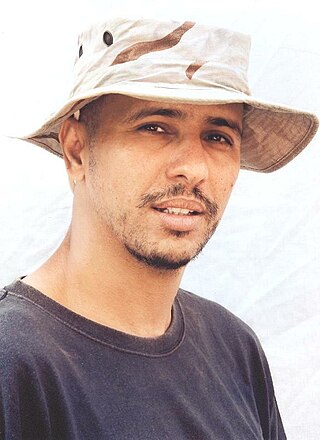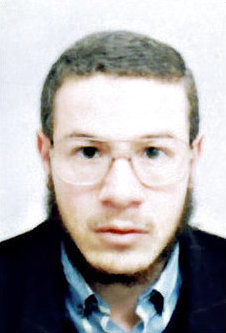
An unlawful combatant, illegal combatant or unprivileged combatant/belligerent is a person who directly engages in armed conflict in violation of the laws of war and therefore is claimed not to be protected by the Geneva Conventions. The International Committee of the Red Cross points out that the terms "unlawful combatant", "illegal combatant" or "unprivileged combatant/belligerent" are not defined in any international agreements. While the concept of an unlawful combatant is included in the Third Geneva Convention, the phrase itself does not appear in the document. Article 4 of the Third Geneva Convention does describe categories under which a person may be entitled to prisoner of war status. There are other international treaties that deny lawful combatant status for mercenaries and children.

Ibrahim Ahmed Mahmoud al Qosi is a Sudanese militant and paymaster for al-Qaeda. Qosi was held from January 2002 in extrajudicial detention in the United States Guantanamo Bay detainment camps, in Cuba. His Guantanamo Internment Serial Number is 54.
Hamdi v. Rumsfeld, 542 U.S. 507 (2004), is a United States Supreme Court case in which the Court recognized the power of the U.S. government to detain enemy combatants, including U.S. citizens, but ruled that detainees who are U.S. citizens must have the rights of due process, and the ability to challenge their enemy combatant status before an impartial authority.

Mohamedou Ould Slahi is a Mauritanian citizen who was detained at Guantánamo Bay detention camp without charge from 2002 until his release on October 17, 2016.
Enemy combatant is a person who, either lawfully or unlawfully, engages in hostilities for the other side in an armed conflict. Usually enemy combatants are members of the armed forces of the state with which another state is at war. In the case of a civil war or an insurrection "state" may be replaced by the more general term "party to the conflict".

Sabir Mahfouz Lahmar is a Bosnian citizen, who won his habeas corpus petition in United States federal court after being held for eight years and eight months in the military Guantanamo Bay detainment camps, in Cuba.
Lahcen Ikassrien is a citizen of Morocco who was held in extrajudicial detention in the United States Guantanamo Bay detainment camps, in Cuba. Ikassrien's Guantanamo ISN was 72. The Department of Defense reports that Ikassrien was born on October 2, 1972, in Targist, Morocco.
Extrajudicial prisoners of the United States, in the context of the early twenty-first century War on Terrorism, refers to foreign nationals the United States detains outside of the legal process required within United States legal jurisdiction. In this context, the U.S. government is maintaining torture centers, called black sites, operated by both known and secret intelligence agencies. Such black sites were later confirmed by reports from journalists, investigations, and from men who had been imprisoned and tortured there, and later released after being tortured until the CIA was comfortable they had done nothing wrong, and had nothing to hide.

Bashir Nashir Ali Al-Marwalah is a Yemeni, who was captured in Pakistan, on September 11, 2002, and transferred to extrajudicial detention in the United States Guantanamo Bay detention camps, in Cuba. His Guantanamo Internment Serial Number is 837. Joint Task Force Guantanamo counter-terrorism analysts reports that Al-Marwalah was born on December 1, 1979, in Al-Haymah, Yemen.

Musab Omar Ali Al Mudwani is a citizen of Yemen who was held in extrajudicial detention in the United States Guantanamo Bay detainment camps, in Cuba.

Mohammed Fenaitel Mohamed Al Daihani is a citizen of Kuwait who was held in extrajudicial detention in the United States Guantanamo Bay detention camp, in Cuba. Al Daihani's Guantanamo Internment Serial Number was 229. Joint Task Force Guantanamo counter-terrorism analysts reports that Al Daihani was born on November 4, 1965, in Kuwait City, Kuwait. Al Dehani was repatriated without charges on November 2, 2005.
Ahmed Mohammed Ahmed Haza al-Darbi is a citizen of Saudi Arabia who was held in the United States Guantanamo Bay detainment camps, in Cuba from August 2002 to May 2018; in May 2018, he was transferred to Saudi Arabia's custody. He was the only detainee held at Guantanamo released during President Donald Trump's administration.

The Military Commissions Act of 2006, also known as HR-6166, was an Act of Congress signed by President George W. Bush on October 17, 2006. The Act's stated purpose was "to authorize trial by military commission for violations of the law of war, and for other purposes".

Moath Hamza Ahmed al-Alwi is a citizen of Yemen, held in extrajudicial detention in the United States Guantanamo Bay detainment camps, in Cuba. His detainee ID number is 28. Guantanamo analysts estimated he was born in 1977, in Bajor, Yemen.

Ibrahim Othman Ibrahim Idris was a citizen of Sudan, formerly held in extrajudicial detention in the United States' Guantanamo Bay detainment camps, in Cuba. His detainee ID number was 036.

Ayoub Murshid Ali Saleh is a citizen of Yemen who was held in extrajudicial detention in the United States Guantanamo Bay detainment camps, in Cuba. His Guantanamo Internment Serial Number is 836. The Department of Defense reports that he was born on April 29, 1978, in Usabee, Yemen.

Ali Hamza Ahmad Suliman al-Bahlul is a Yemeni citizen who has been held as an enemy combatant since 2002 in the United States Guantanamo Bay detention camp. He boycotted the Guantanamo Military Commissions, arguing that there was no legal basis for the military tribunals to judge him.
The National Defense Authorization Act (NDAA) for Fiscal Year 2012 is a United States federal law which among other things specifies the budget and expenditures of the United States Department of Defense. The bill passed the U.S. House on December 14, 2011, the U.S. Senate on December 15, 2011, and was signed into United States law on December 31, 2011, by President Barack Obama.
Sufyian Ibn Muhammad Barhoumi is an Algerian man who was held in extrajudicial detention in the United States Guantanamo Bay detention camps, in Cuba. The Department of Defense reports that he was born on July 28, 1973, in Algiers, Algeria.

Muktar Yahya Najee Al Warafi is a citizen of Yemen, who was held in extrajudicial detention in the United States Guantanamo Bay detainment camps in Cuba. The Department of Defense estimate that Al Warafi was born in 1974, in Ta'iz, Yemen.












